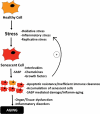Probiotic bacteria as modulators of cellular senescence: emerging concepts and opportunities
- PMID: 31818183
- PMCID: PMC7524351
- DOI: 10.1080/19490976.2019.1697148
Probiotic bacteria as modulators of cellular senescence: emerging concepts and opportunities
Abstract
Probiotic bacteria are increasingly gaining importance in human nutrition owing to their multifaceted health beneficial effects. Studies have also shown that probiotic supplementation is useful in mitigating age-associated oxi-inflammatory stress, immunosenescence, and gut dysbiosis thereby promoting health and longevity. However, our current understanding of the process of aging suggests a strong interrelationship between the accumulation of senescent cells and the development of aging phenotype, including the predisposition to age-related disorders. The present review studies the documented pro-longevity effects of probiotics and highlights how these beneficial attributes of probiotics could be related to the mitigation of cellular senescence. We present a perspective that to fully understand and comprehend the anti-aging characteristics of probiotic bacteria; it is imperative that probiotics or their synbiotic amalgamation with plant polyphenols, be studied under the purview of cellular senescence, that may ultimately help devise probiotic-based anti-senescence strategies.
Keywords: Probiotics; ROS; SASP; aging; inflammation; senescence.
Figures


References
Publication types
MeSH terms
Substances
LinkOut - more resources
Full Text Sources
Other Literature Sources
Medical
